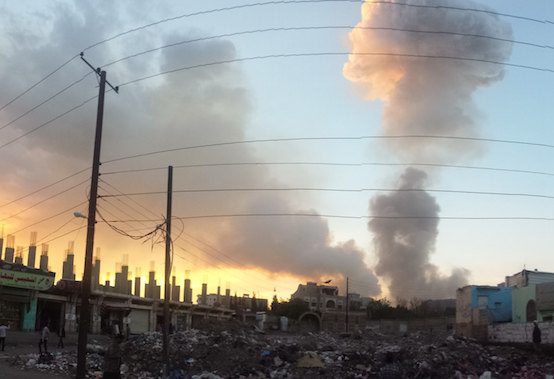Congress’ Failure on Yemen

John Hudson reports on the Foreign Relations Committee’s increased oversight of weapons shipments to Saudi Arabia:
The Senate panel’s new power flex will not stop the weapons shipments. But they force more oversight of arms sales even as lawmakers continue debate on whether — and how aggressively — to rein in Riyadh.
Democratic Sens. Ben Cardin of Maryland and Ed Markey of Massachusetts have repeatedly raised concerns about “gross violations of human rights” throughout Riyadh’s military campaign in Yemen, which began last March.
Senate Foreign Relations Chairman Bob Corker (R-Tenn.) continues to support the Saudi-led operation against the Houthis, which he believes will help “end the conflict, facilitate humanitarian relief, and restore the legitimate government of Yemen,” an aide told FP.
Sens. Cardin and Markey deserve some credit for at least doing that much, but the fact remains that the latest arms deal will go through and the U.S. will continue to provide the weapons used to wage the war on Yemen. Increased oversight of these shipments is a start, but it is woefully inadequate. While lawmakers debate whether to rein in the Saudis, an entire country has been brought to the brink of famine with our government’s assistance.
Corker’s position is disgraceful but not unexpected. The Saudi-led intervention isn’t going to help “end the conflict” since it has been the major factor in escalating and worsening the conflict. The Saudis aren’t interested in facilitating humanitarian relief, since they and their allies are the ones preventing basic necessities from coming into Yemen with their blockade. Restoring Yemen’s government isn’t something that is going to be achieved by force, and the government’s support for the intervention has badly undermined whatever legitimacy it had in many parts of the country. Providing the Saudis with more arms isn’t going to hasten the conflict’s end, but will encourage the Saudis to press on with their campaign despite its obvious failures. In the process, the U.S. will be partly to blame for the civilian casualties that the campaign will keep causing:
“Providing the Saudis with more bombs under these circumstances is a recipe for greater civilian deaths, for which the U.S. will be partially responsible,” said Joe Stork, a deputy director at Human Rights Watch.
Comments